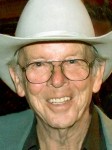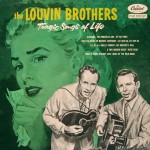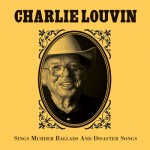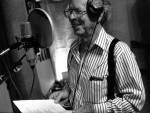Charlie Louvin RIP: July 7, 1927 – January 26, 2011
 Charlie Louvin, a star of the Grand Ole Opry for more than 50 years, died early on Wednesday morning (1/26) at his home in Wartrace, about 50 miles southeast of Nashville, Tennessee. He was 83 years old and had suffered from pancreatic cancer for about six months.
Charlie Louvin, a star of the Grand Ole Opry for more than 50 years, died early on Wednesday morning (1/26) at his home in Wartrace, about 50 miles southeast of Nashville, Tennessee. He was 83 years old and had suffered from pancreatic cancer for about six months.
Charles Elzer Louvin (or Loudermilk to give him his proper family name) was born in Section, Alabama, one of seven children who grew up on the family’s 23-acre farm in Sand Mountain.
Along with his older brother Ira (born April 21, 1924), Charlie Louvin is an icon in the world of traditional country and bluegrass music. They are much revered by the rock-‘n’-roll music fraternity also.
Ira got a mandolin when he was 19 and urged the then 16-year-old Charlie to learn to play the guitar so they could play music together. Charlie and Ira worked in the fields on the family farm and began singing together as teenagers, developing the harmony that would become their trademark.
As they were growing they sang in church also.
The brothers adopted the name Louvin Brothers in the 1940s as they began their career and later they made it legal.
 Later they worked on radio stations in Knoxville and Memphis in the 1940s, and signed their first record deal with Apollo in 1947. Later, in 1949, they released a single on the Decca Records label and in 1951 and 1952 they recorded 12 sides for MGM, including I’m Changing the Words to My Love Song, The Get Acquainted Waltz, God Bless Her (‘Cause She’s My Mother), Weapon of Prayer, Robe of White, The Great Atomic Power, Insured Beyond The Grave, The Gospel Way and The Sons and Daughters of God, all written by the brothers.
Later they worked on radio stations in Knoxville and Memphis in the 1940s, and signed their first record deal with Apollo in 1947. Later, in 1949, they released a single on the Decca Records label and in 1951 and 1952 they recorded 12 sides for MGM, including I’m Changing the Words to My Love Song, The Get Acquainted Waltz, God Bless Her (‘Cause She’s My Mother), Weapon of Prayer, Robe of White, The Great Atomic Power, Insured Beyond The Grave, The Gospel Way and The Sons and Daughters of God, all written by the brothers.
At the end of 1952 the Louvin Brothers signed for Capitol Records, singing and recording sacred songs initially. To be fair, their later MGM recordings had been of Gospel material also.
During the next three years they recorded classics such as The Family Who Prays (Never Shall Part), Born Again, Let Us Travel, Travel On, If We Forget God, From Mother’s Arms to Korea, Make Him A Soldier, Love Thy Neighbor As Thyself and Just Rehearsing.
In 1955, they decided to try their luck with a secular song they had written, When I Stop Dreaming. It became their first Top 10 hit, thanks to their harmonies that used unconventional intervals drawn from the shape-note tradition and poetically bittersweet lyrics of a broken love affair. That was followed quickly by their only No. 1 single, I Don’t Believe You’ve Met My Baby.
From 1955 through 1962, the Louvin Brothers had a dozen hits on the Billboard country chart, including You’re Running Wild, Cash on the Barrelhead, Don’t Laugh, My Baby’s Gone, Must You Throw Dirt in My Face, How’s The World Treating You? and Knoxville Girl.
 Their legacy includes other great recordings of songs such as The Angels Rejoiced Last Night, Satan Is Real, Lord, I’m Coming Home, Praying, Are You Washed In The Blood Of The Lamb?, The Christian Life, What Is Home without Love?, Are You Teasing Me?, A Tiny Broken Heart, Hoping That You’re Hoping, Satan’s Jeweled Crown, Pitfall, The River of Jordan, Are You Afraid To Die?, and My Curly Headed Baby.
Their legacy includes other great recordings of songs such as The Angels Rejoiced Last Night, Satan Is Real, Lord, I’m Coming Home, Praying, Are You Washed In The Blood Of The Lamb?, The Christian Life, What Is Home without Love?, Are You Teasing Me?, A Tiny Broken Heart, Hoping That You’re Hoping, Satan’s Jeweled Crown, Pitfall, The River of Jordan, Are You Afraid To Die?, and My Curly Headed Baby.
The Louvins’ popularity waned in the early 1960s and personality differences caused the brothers to split in 1963. Charlie Louvin went on to work as a solo act (as did Ira until he was killed in a car crash in June 1965). His biggest hits were I Don’t Love You Anymore (No. 4 in 1964) and See the Big Man Cry (No. 7 in 1965). In all, he had 30 Billboard-charting singles from 1964 to 1989, some of those, including Something to Brag About, with Melba Montgomery, one with Emmylou Harris, one with Jim & Jesse and one with Roy Acuff, whose songs are well-featured in the Louvin’s recording catalogue.
Thereafter Charlie Louvin recorded regularly- a studio album (for Copper Creek) and a live set, recorded in Holland, with Charles Whitstein; Bluegrass Style (Niptune NPBCD 029 (1994)); a 10-track set for Pete Drake’s First Generation Records that includes some re-makes of titles from Louvin’s Capitol era; a handful for the Tompkins Square label – including Steps to Heaven, a collection of traditional gospel tunes, released in September 2008, followed about two months later by the tragedy-themed Charlie Louvin Sings Murder Ballads and Disaster Songs.
Two albums were released in 2010: The Battles Rage On (True North), produced by Mitchell Brown and featuring songs about war and redemption, and Hickory Wind (Tompkins Square), a live set recorded at City Auditorium in Waycross, Georgia, in 2009. The Battle Rages On, a collection of war songs, which includes the talents of special guests Del McCoury and Jamie Dailey and was released last November.
Louvin helped keep the duo’s memory alive throughout the rest of his career, often incorporating Louvin Brothers material with his own. In 1992, Louvin paired with Charles Whitstein for the Louvin Brothers Music Celebration tour. The duo visited Europe with Whitstein on at least four occasions.
 The Louvin Brothers’ sound, with Ira’s pure high tenor typically floating atop Charlie’s strong tenor-baritone melodies but often switching mid-song, derived from church-based ‘shape-note’ singing, an a cappella style they picked up while growing up in their musically inclined family in rural Alabama.
The Louvin Brothers’ sound, with Ira’s pure high tenor typically floating atop Charlie’s strong tenor-baritone melodies but often switching mid-song, derived from church-based ‘shape-note’ singing, an a cappella style they picked up while growing up in their musically inclined family in rural Alabama.
In so doing the brothers modernized the close-harmony singing of Depression-era acts like the Blue Sky Boys, the Delmore Brothers (for whom they did a tribute album) and the Callahan Brothers and, later, the Monroe Brothers, and influenced the keening vocal interplay of the Everly Brothers.
Their harmonies sat very comfortably alongside that of bluegrass music and bluegrass musicians adapted and rearranged many of their songs that became bluegrass standards.
Jim & Jesse recorded 10 of the Louvin Brothers’ songs for a tribute album, Saluting the Louvin Brothers (Epic BN-26465, 1969). They also recorded with Charlie Louvin for an album on the Soundwaves label (SWS-3308, 1982).
Other bluegrass artists who have recorded songs from the Louvin Brothers’ repertoire include Joe Val & The New England Bluegrass Boys (You’re Running Wild), Nashville Bluegrass Band (Are You Afraid to Die?) and Del McCoury & The Dixie Pals (When I Stop Dreaming). Alison Krauss cut a near-definitive version of I Don’t believe You’ve Met My Baby, which was included in her 1995 Now That I’ve Found You collection. The Krauss track was originally released on Jerry Douglas’ Slide Rule album in 1992.
The Whitstein Brothers (Robert and Charles), for whom the Louvin Brothers were heroes, recorded 10 of the Louvins’ songs for their debut album, Sing Gospel Songs of the Louvins (re-issued by Rounder Records) and did others for subsequent releases.
The Louvin Brothers’ influence spread well beyond the standard country music field, being embraced by Chris Hillman and Gram Parsons, who, in turn, influenced a young Emmylou Harris, whose recording of If I Could Only Win Your Love gave Harris her first Top 10 country hit. Harris recorded When I Stop Dreaming and Every Time You Leave also.
http://www.youtube.com/watch?v=zLQu5Vidl6oThe Parsons/Hillman axis was responsible for the Byrds recording The Christian Life for the Sweethearts of the Rodeo album. Parsons, accompanied by Harris, included a live version of Cash on the Barrelhead in a medley on his Grievous Angel album. Harris was one of the Louvins’ most passionate advocates; with the younger Louvin brother she had a minor chart record in 1979 with the duet Love Don’t Care.
 Others who have lauded the music of the Louvin Brothers include the Raconteurs, who recorded The Christian Life, Wilco’s Jeff Tweedy, Lambchop’s Kurt Wagner and Elvis Costello. Tweedy’s alt-country band Uncle Tupelo recorded The Great Atomic Power and the Notting Hillbillies recorded Weapon of Prayer (both in the 1990s) and, very recently, roots rocker Billy Bob Thornton and the Boxmasters recorded Knoxville Girl, a folk song that the brothers helped to popularize.
Others who have lauded the music of the Louvin Brothers include the Raconteurs, who recorded The Christian Life, Wilco’s Jeff Tweedy, Lambchop’s Kurt Wagner and Elvis Costello. Tweedy’s alt-country band Uncle Tupelo recorded The Great Atomic Power and the Notting Hillbillies recorded Weapon of Prayer (both in the 1990s) and, very recently, roots rocker Billy Bob Thornton and the Boxmasters recorded Knoxville Girl, a folk song that the brothers helped to popularize.
The British rock/pop group the Beatles were influenced by Charlie and Ira through the Everly Brothers. It is ironic that the Louvin Brothers had to contend with the overwhelming rise to prominence of rock ‘n’ roll music yet artists from that genre now love Charlie and Ira Louvin so much.
Louvin’s presence in the contemporary rock world was confirmed when he was invited to be an opening act for Cake’s Unlimited Sunshine tour in 2003.
Charlie Louvin’s wonderful, warm, light-baritone voice may be silent, but he will be remembered and his music will live forever in the hearts of music enthusiasts of many persuasions.
Honors
- 1979, The Louvin Brothers were inducted into the Nashville Songwriters Hall of Fame.
- 1991, The Louvin Brothers were inducted into the Alabama Music Hall of Fame.
- 1992, The Louvin Brothers were honored with an IBMA Certificate of Merit for their lifetime contributions to bluegrass music.
- 2001, The Louvin Brothers were inducted into the Country Music Hall of Fame.
- They have won 2 Grammies, received the ‘Living Legend’ award from the Major Independent Record Labels and have received more than 12 BMI performance awards.
Selective Discography:
Louvin Brothers
- Close Harmony (Bear Family), an 8-CD set with booklet, presents all of the brothers’ recordings
- Songs That Tell a Story (Rounder)
- Nearer My God to Thee (King)
- Charlie Louvin – Greatest Hits (Collector’s Choice Music)
Tribute albums
- Livin’, Lovin’ Losin’: Songs of the Louvin Brothers (Universal South), a musical tribute to the Louvin Brothers (featuring James Taylor, Vince Gill, Merle Haggard, Dolly Parton, Johnny Cash, Dierks Bentley and Joe Nichols). The album won two Grammy Awards, for Best Country Album and Best Country Collaboration (2004).
- Whitstein Brothers Sing Gospel Songs of the Louvins (The Whitstein Brothers) (Rounder) (originally released independently in 1969 and re-released by Rounder in 1994)
- Songs of the Louvin Brothers (Easy Disc), with Joe Val, Hazel Dickens/The Johnson Mountain Boys, Del McCoury, Nashville Bluegrass Band, Ricky Skaggs/Peter Rowan, the Dreadful Snakes, Jim & Jesse and Longview.







